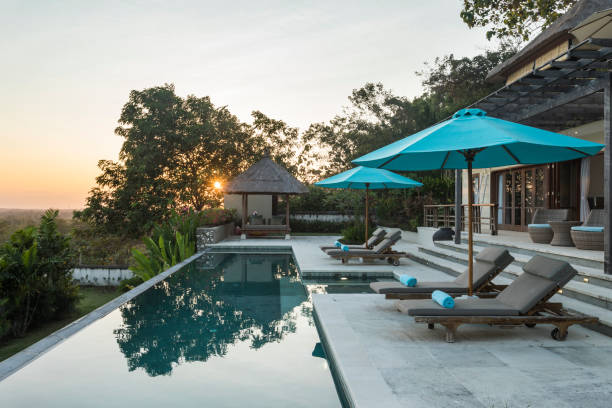Building a House in Indonesia: Complete Legal Steps for 2025



Are you planning to build a house in Indonesia? Whether you’re a local resident or a foreign investor, understanding the legal procedures is essential to ensure your construction project complies with the regulations. Failing to follow the correct legal process can lead to fines, delays, or even the demolition of your building. At The Bali Lawyer, we provide expert legal assistance to guide you through each step of the process, ensuring your project is safe, secure, and legally compliant.
In this comprehensive guide, we will walk you through the essential legal steps to build a house in Indonesia, including land ownership, zoning, permits, construction compliance, and certification.
Step 1: Determine Land Ownership Status
Before you begin any construction work, you must first ensure that the land you intend to build on is legally owned and properly zoned.
A. Check Land Certificate
Make sure the land is registered under a valid land certificate issued by the National Land Agency (BPN). Common types include:
SHM (Sertifikat Hak Milik) – Freehold title
HGB (Hak Guna Bangunan) – Right to build (suitable for foreigners through a legal entity)
B. Conduct Land Due Diligence
We help you:
Verify authenticity of the land certificate
Ensure there are no disputes or encumbrances
Confirm that land is not classified as protected or restricted
Step 2: Review Spatial and Zoning Regulations
The next step is to ensure that your plot of land is suitable for residential construction. This is governed by local spatial planning regulations (RTRW) in each region.
A. KKPR (Kesesuaian Kegiatan Pemanfaatan Ruang)
You need to obtain the KKPR, which confirms that your construction plan aligns with the designated land use. This is processed via Indonesia’s OSS (Online Single Submission) system.
Our legal team will:
Check the zoning regulations in your area
Prepare and submit the KKPR application
Liaise with government offices for approvals
Step 3: Obtain the PBG (Building Approval)
Previously known as the IMB (Izin Mendirikan Bangunan), the PBG (Persetujuan Bangunan Gedung) is now the official permit required for any construction work.
What is Required for a PBG Application?
Land ownership certificate
KKPR approval
Architectural and structural design drawings
Statement of building safety
Fire safety, accessibility, and environmental documents
We assist with:
Coordinating with certified architects and engineers
Preparing the technical documentation
Submitting your application through the OSS RBA system
Managing communications with regional building authorities
Step 4: Register for Environmental Approvals (If Required)
Depending on the size and impact of your construction project, you may need to comply with environmental regulations.
Types of Environmental Permits:
UKL-UPL (Environmental Management and Monitoring) – for moderate impact
AMDAL (Environmental Impact Assessment) – for large-scale projects
For residential home construction, UKL-UPL may be required in certain zones. Our team advises if this is needed and handles all application requirements.
Step 5: Hire a Licensed Contractor
Indonesian law requires that construction be carried out by a registered and licensed construction company (BUJK). Hiring a legal contractor ensures your project meets safety, quality, and regulatory standards.
We help you:
Verify contractor licenses
Draft legal construction agreements
Monitor the construction process for legal compliance
Step 6: Conduct Building Inspections
During construction, inspections may be required at various stages to ensure your building follows approved plans. These inspections may include:
Foundation and structure checks
Fire safety and ventilation system assessments
Sanitation and waste management reviews
Our consultants guide you through each inspection step, helping you prepare and coordinate with local authorities.
Step 7: Apply for SLF (Sertifikat Laik Fungsi)
Once your house is completed, you must apply for an SLF (Certificate of Building Worthiness) before occupying or using the property.
Why SLF Is Important:
It confirms the building is safe and functional
It’s necessary for utilities, leasing, or resale
It helps avoid legal issues or sanctions
We handle:
Preparation of final construction reports
Application submission and coordination with the SLF issuing agency
Organizing the final building inspection
Step 8: Register the Building with BPN
After completing the SLF process, the last legal step is registering the building with the National Land Agency (BPN). This updates your land certificate to include the building as a legal structure on the plot.
We assist in:
Completing building registration documents
Handling administrative processing with BPN offices
Ensuring your property is legally recorded
Legal Tips for Foreigners Building in Indonesia
Foreigners are not allowed to directly own land in Indonesia under their personal name. However, they can legally build through:
PT PMA (Foreign Investment Company) – Suitable for commercial or residential investment
Leasehold Agreements – Long-term lease with building rights
Hak Pakai (Right to Use) – Subject to limitations and eligibility
Our firm helps foreigners navigate ownership structures that are legal, secure, and practical for long-term investment and property development.
How The Bali Lawyer Supports Your Project
We provide complete legal support for every stage of your residential construction project in Indonesia:
Land due diligence
Zoning and permit application
Environmental documentation
Contractor and construction compliance
PBG, SLF, and BPN registration
Legal advisory for foreign ownership
Whether you are building a villa in Bali, a family house in Java, or an investment property in Lombok, our legal team ensures that your construction project complies with Indonesian law from start to finish.
Estimated Timeline for Building Permit Process
Here’s an estimated timeline for legal steps to build a house in Indonesia:
| Step | Duration |
|---|---|
| KKPR Application | 1–2 weeks |
| PBG Approval | 4–8 weeks |
| Environmental Approval (if needed) | 2–6 weeks |
| Construction Phase | Varies by project |
| SLF Application | 3–4 weeks |
| Building Registration at BPN | 2–3 weeks |
Note: Timeline may vary based on regional regulations and the completeness of documents.
Why Work with The Bali Lawyer?
Experienced Legal Team with deep knowledge of property regulations in Indonesia
Fast, Transparent Process that keeps you updated at every step
End-to-End Services covering everything from land to occupancy
Nationwide Coverage including Bali, Jakarta, Lombok, Surabaya, and Java
Avoid costly mistakes and delays. Let our legal experts handle your property’s compliance needs while you focus on your vision.
Start Your Project with Confidence
Building a home in Indonesia is a significant investment. Make sure it’s done right, from land acquisition to final permits. With The Bali Lawyer, you can count on accurate legal guidance, fast processing, and complete compliance with Indonesian law.
